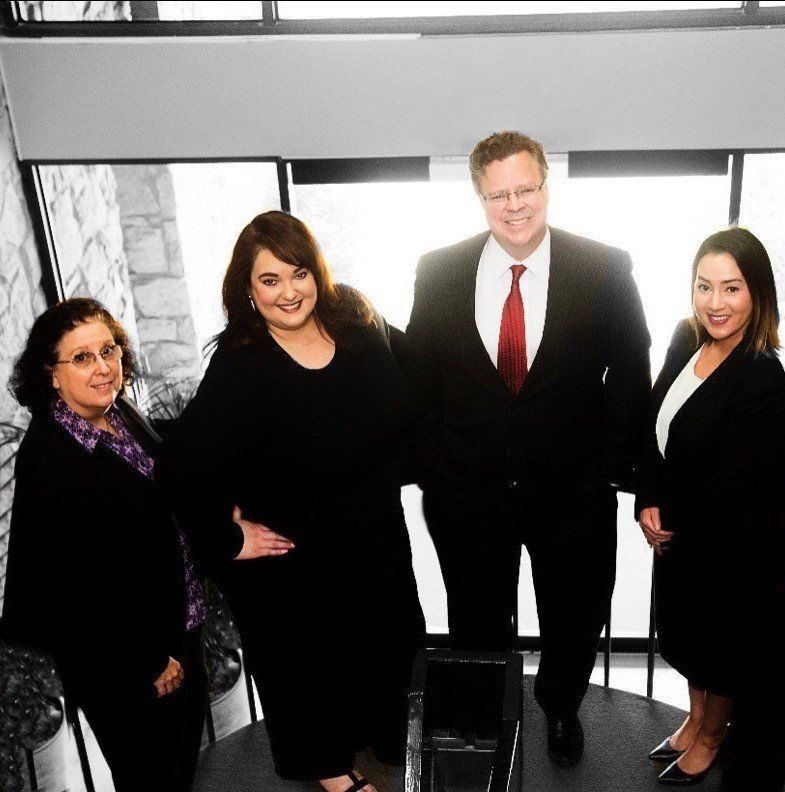TRADEMARK INFRINGEMENT
DALLAS-FORT WORTH
Our experienced trademark litigation attorneys handle trademark infringement defense in federal court, state court, and the Trademark Trial & Appeal Board (TTAB ).
TRADEMARK LITIGATION SERVICES
What Is A Trademark?
A trademark is a brand name or service mark that includes any word, phrase, device, or any combination, used or intended to be used to identify and distinguish the goods/services of one seller or provider from those of others, and to indicate the source of the goods/services. For instance, a trademark protects slogans and symbols that identify a business or brand and distinguishes it from others.
Trademark Protection & Trademark Confusion
Trademarks are your company's signature, and like a personal signature, they depend upon the trust and good faith people place in them. Your trademark is only as valuable as the worth and trust your customers place in your company and the products sold under the mark. Hence, trademark infringement can be very harmful and detrimental to your company and products. Users of a misappropriated mark can often damage and destroy the reputation of your mark. For this reason, perhaps no intellectual property infringement is as damaging as trademark infringement; not only does the infringer steal profits to which you are rightfully entitled, he or she can also decrease the value of the trademark and your ability to make profits using it. Trademark infringement suits can be very complex and lengthy; however, there are several remedies available to the infringed upon party, including:
- Injunctive Relief: The most common form of relief in trademark infringement cases is the imposition by the court of an injunction against the offending party, prohibiting them from further use of the mark. Such injunctive relief affirms and protects the prevailing parties rights to the mark;
- Profits : Pursuant to 15 USC §1117, the plaintiff in a trademark infringement suit may recover any profits the defendant obtained by using the plaintiff's trademark;
- Actual Damages: The plaintiff may also be entitled to any damages sustained due to the misappropriation of the mark. Such damages can include compensation for any lost value in the mark such as may be caused by the affixing of the mark to inferior goods;
- Treble Damages : If the infringement of a trademark involves the use of a counterfeit mark or designation, unless there are extenuating circumstances, the court shall award the plaintiff three times the profits or damages, whichever is greater, assessed in the case;
- Statutory Damages: Instead of actual damages and profits, the plaintiff may elect to recover statutory damages prior to the final judgment. The amount of statutory damages can vary greatly depending on the particular circumstances of the case and are subject to the court's discretion, but in any case, shall not be less than $1,000 per violation and not more than $2,000,000 per violation; and
- Costs: Depending on the circumstances of the case, the plaintiff may also be entitled to recover reasonable costs of the action and/or attorney's fees.
Trademark Infringement Lawyer
Trademark infringement is a violation of a trademark holder's rights and requires maximum efforts to protect your brand. We have a team of experienced and creative trademark and technology litigators across our offices. These attorneys have litigated in many domestic trademark litigation venues, the Federal Circuit, the International Trade Commission, the Patent and Trademark Office, the Trademark Trial and Appeal Board, and ICANN. Our Dallas trademark infringement lawyers represent clients in trademark filings and trademark infringement throughout the United States, including the U.S. District Court's for the Eastern District of Texas, the Northern District of Texas, and the Western District of Texas.
Trademark Resources & Services
- Trademark Overview
- Trademark Registration
- Trademark Licensing
- Trademark Infringement
- Trademark Protection
- Trademark Coexistence
- Trademark Guidelines
- Trade Dress Protection
- Trademark Oppositions & Trademark Cancellations
- Cybersquatting
- UDRP Domain Name Proceedings
- Trademark Portfolio Management
Need any help?
Industry Resources & Services
- Alcohol & Beverage Law
- Blockchain Law
- Cosmetics Product Law
- Crypto-currency Law
- Cyber-security Law
- Digital Marketing
- eCommerce Law
- Energy Law
- Fashion Industry Law
- Health Technology Law
- Oil & Gas Law
- Product Industry Overview
- Professional Services law
- Real Estate Development Law
- Restaurant Services Law
- Retail Business Law
- Software Industry Law
- Sporting Goods Law
- Technology Law
- Video Gaming Industry Law
-
Trademark Overview
Button -
Trademark Registration
Button -
Trademark Licensing
Button -
Trademark Infringement
Button -
Trademark Protection
Button -
Trademark Guidelines
Button -
Trade Dress Protection
Button -
Oppositions & Cancellations
Button -
Cyber Squatting
Button -
UDRP Proceedings
Button -
Trademark Portfolio
Button -
Trademark Coexistence
Button
Additional Trademark Infringement Focus
The 7 Factors of Trademark Infringement
Consumers often use trademarks to identify the source of the goods or services they are purchasing. As such, trademark owners need to protect their trademark brand and prevent others from using trademarks that are "confusingly similar." Although it varies by jurisdiction, Courts generally consider seven factors in a trademark infringement analysis to determine whether there is a "likelihood of confusion" between two competing brands.
Factor 1. Relatedness of Goods or Services:
“Would an average consumer paying an average amount of attention be more likely than not to purchase one product (or service) if they believed it is in fact a different product (or service)?” The more similar the trademark brand names, and the more similar the goods and services are related thereto, the stronger the factor weighs in favor of infringement. Unrelated goods or services, or goods or services that are not commonly found together, are less likely to be found overlapping and therefore less likely to infringe. Dissimilar goods or services, albeit similar in branding, may be less likely to be found to infringe upon each other.
Factor 2. The similarity of Marks:
Are the brand or trademarks similar? Are they visually and phonetically identical? What are the meaning of the words within each trademark, and any translations there?” The Courts have found the following trademarks too similar:
• ECHO 911 (software for emergencies) with ECHO112 (smartphone application);
• Simoniz (cleaning) vs. Permanize (cleaning); and
• Floss Bone (dog chews) and Flossies (dog treats)
Factor 3. Similarity In Appearance:
Like similarity of marks, the trademark appearance and trademark design may also be too similar and, therefore, reasonably cause trademark confusion to the average consumer.
Factor 4. Similarity In Sound:
How does each trademark sound when spoken aloud? The more similar the sound, the more likelihood of confusion may exist. The Courts have found the following trademarks too phonetically similar:
• Seiko v. Seycos;
• Coca-Cola and Cup-O’-Cola;
• Porsche and Porsha.
Factor 5. Similarity In Meaning:
Trademark similarity weights in favor of finding trademark infringement, and the courts have found the following trademarks too similar:
• MR. CLEAN vs. MR. RUST;
• Pledge v. Promise; and
• Aqua-Care v. WaterCare.
Factor 6. Design Marks:
Visual similarities between trademarks can cause a likelihood of confusion. Simply, are the trademark designs too similar?
Factor 7. Likely to Deceive:
Is the public likely to be so confused by the trademark similarities such that they will confuse the source of the two brands?
CLIENT MATTERS
5,000+
YEARS OF SERVICE
25+
Award Winning
Recognized in the legal industry as dedicated board-certified lawyers and Rising Stars.
Expert Team
Your project will be handled by legal experts every time. You will have the most experienced attorneys working for you.
Quality Representation
Wilson Legal Group P.C.
d/b/a Wilson Whitaker Rynell
(972) 248-8080 (Dallas) MAIN OFFICE
(713) 830-2207 (Houston) Appointment Only
(512) 691-4100 (Austin) Appointment Only
For more information on how we can assist in your intellectual property, commercial litigation, or other personal needs, let us know how we can help you:
Contact Us - Main Page
We will get back to you as soon as possible.
Please try again later.
Disclaimer:
This form does not establish an attorney-client relationship, and should only be used to contact the firm about scheduling a call or meeting. No confidential or sensitive information should be sent using this form.
The law office of Wilson Legal Group P.C. (d/b/a Wilson Whitaker Rynell) represents clients nationwide, including Dallas, Austin, Houston, and other Texas areas such as Fort Worth, Arlington, Carrollton, Plano, Allen, Lewisville, Flower Mound, Irving, Denton, McKinney, North Richland Hills, and all cities within Dallas County, Tarrant County, Collin County, and Denton County.
SERVICES
OFFICES
ABOUT
CONTACT
BLOG
JOIN OUR NEWSLETTER
Wilson Whitaker Rynell
16610 Dallas Parkway, Suite 1000
Dallas, Texas 75248
972-248-8080 (MAIN)
972-248-8088 (FAX)
info@wrrlegal.com (E-MAIL)













